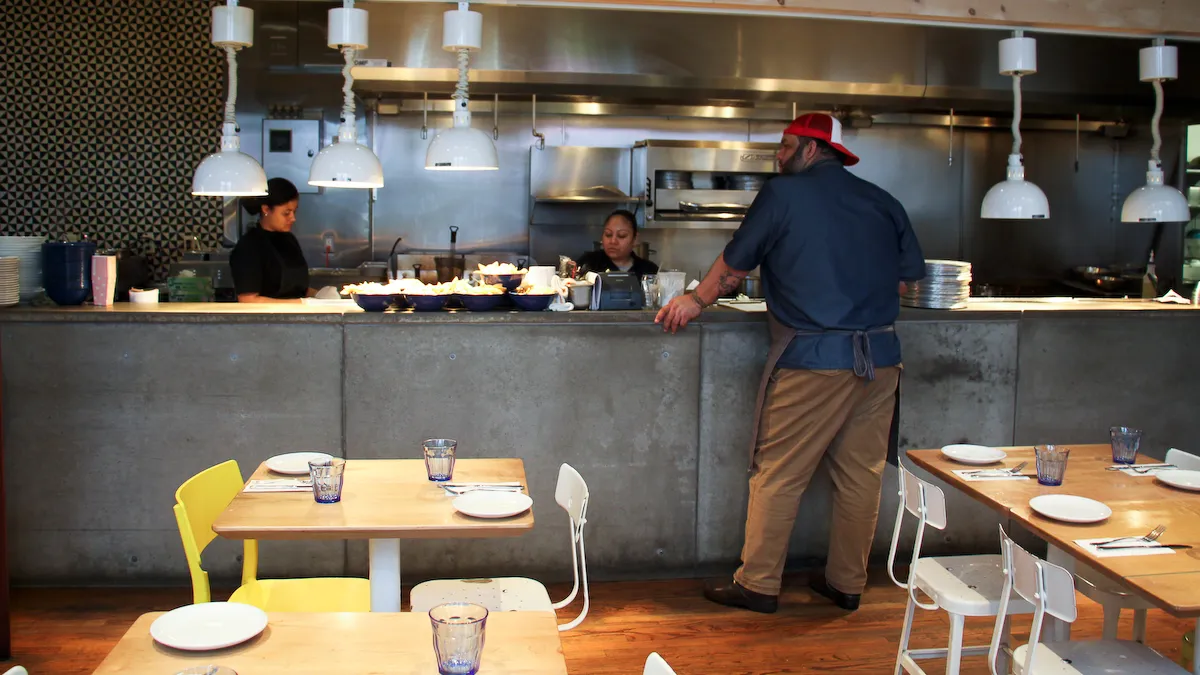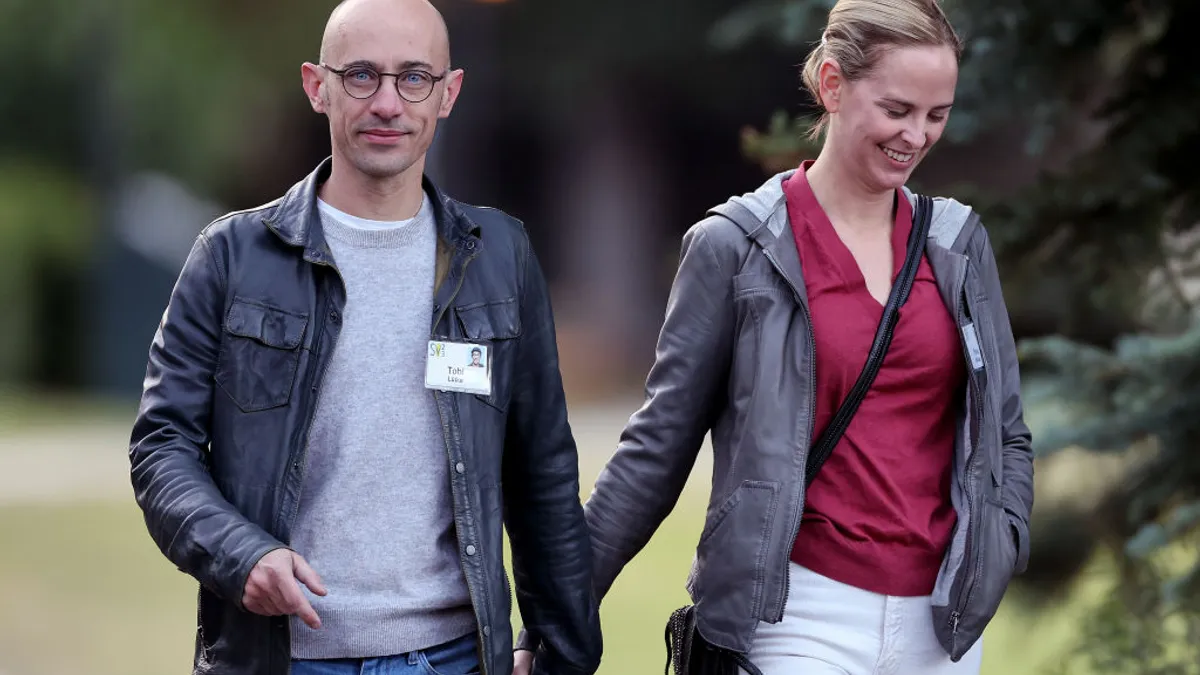To hear Daniel McLaughlin talk about his employees, it's clear that the restaurateur both understands the unique needs of food-service workers and is committed to meeting them.
McLaughlin, owner of Mission Taqueria in Philadelphia, sat at a table in his restaurant on a recent afternoon between the lunch and dinner rush, talking with HR Dive about 401(k) matches and keeping workers creatively challenged — topics you'd be hard-pressed to hear discussed in other restaurants.
The churn
But the mindset is providing an advantage when it comes to retention, according to McLaughlin; he said competitors have even taken note. And for a 150-seat restaurant frequently serving more than 800 customers a day, long-tenured employees can be a game changer.
Employee retention is no easy feat in food service, and anyone who has worked in the industry knows exactly why. Restaurant work, McLaughlin said, is mentally, emotionally and physically demanding. Employers must be sensitive to that in many respects, he said. Mission, for example, tries to keep that fact top-of-mind when it comes to setting schedules.
It's also a line of work that frequently comes with limited career opportunities, and no support for workers for when they get sick or near retirement. But some in the industry say it doesn't have to be that way, and one need only look to the two-and-a-half year old restaurant on Philadelphia's Sansom Street to see what that looks like in practice.
A recipe for success
Mission, open seven days a week, serves brunch, lunch and dinner. It has 77 employees, and every manager either came with McLaughlin from his previous restaurant job or was promoted from within Mission. And when it comes to new hires, he said the restaurant aims to never be in a position where it's desperate for talent. In fact, a directive to "always be hiring" is memorialized in the restaurant's manual; having people in the pipeline helps the restaurant focus on quality hires.
McLaughlin said Mission started thinking about employee engagement in earnest last fall, but it's obvious that the mindset comes naturally to him. Several times, he mentioned how important it is that employees are engaged, that they're "happy, making money and feeling supported."
Benefits
To that end, the restaurant offers benefits to those working at least 30 hours per week. Healthcare, of course, is mandatory, but McLaughlin is proud of the options offered, noting the plans' "approachable" costs. What's more, such workers are eligible to participate in the company's 401(k) plan, which includes a match. So far, about 12 non-management employees have taken advantage of the offering. "It's nice to offer when you have people who are a little more career-minded," McLaughlin said.
In another move of support, Mission plans to roll out paid sick leave in the coming weeks. "In the restaurant industry, if you get sick, you can't survive," he said. Going beyond what the city mandates, the restaurant is hoping to provide a week of paid leave at one year of employment, and two weeks after two years. It's also considering a third tier, perhaps one for five years of service, McLaughlin said.
Paid leave can be difficult to implement for tipped workers, as much of their income comes directly from customers. But McLaughlin said he's confident they'll have the details ironed out this summer — "it was one of our New Year's resolutions."
Investments in employees
Another piece to the retention puzzle is engagement and to accomplish that, McLaughlin recommends that employers find "an opportunity to invest in your own people." That's especially true for those employees who are really devoted, he said. "I pay attention to that," and work to keep them engaged, he said — even in little ways.
Sometimes that manifests in having an employee with artistic skills take charge of the sidewalk chalkboard. Other times it's more of a literal investment: hiring an employee who's also an art student to make the restaurant's signature glassware or purchasing t-shirts and aprons from another employee's screen-printing business.
And sometimes it looks more like traditional employee development. Mission cross-trains kitchen employees and creates opportunities — like its recurring "TACOLAB" chef collaboration event — for employees to try out new techniques. Similarly, a bartender who sought more responsibility is now in charge of mezcal education for the staff as the restaurant works to expand its drink offerings. And a planned catering division will soon give several employees the opportunity to learn about that aspect of the industry, McLaughlin said. It's important to find "things that keep people creatively challenged," he explained.
Ownership
As employees seek greater transparency, a voice at work and more ownership over their duties, employers are moving away from top-down mandates — and Mission has been quick to embrace this philosophy.
Some employees, for example, voiced concern with the restaurant's tip policy. "We're a pooled house for tips," McLaughlin said, explaining that the clientele tends to be group-heavy; it's not uncommon for one server to land a group of nearly 20 patrons — something that would be deeply coveted in a non-pooled setting. But when some questioned the arrangement, "we put it out like a referendum," he said. Mission gave everyone a week or two to discuss the pros and cons and then they put it to a vote — and the team decided to stick with the pooling arrangement.
Similarly, employees were reporting that, more than anything else, customers were clamoring for the option to mix and match tacos, which are sold in sets of three. Previously eschewed because of the difficult logistics for the kitchen, McLaughlin said the team talked and hashed out a plan. "It was a rough couple of days," he said, "but we did it."
It's important to hear what the group is thinking, he said. "They can provide the direct feedback from the customers; they're the ones on the front line."
A side of teamwork
Camaraderie is key, too. Being in the hospitality industry, employees at Mission help customers have fun, so "it's nice to have fun with our own employees," McLaughlin said.
This means, among other things, shutting down every year on the restaurant's birthday for an all-staff outing, like a day playing kickball.
It's those kinds of things that have created the restaurant's culture of teamwork. At Mission — or "Big Taco" as employees have affectionately dubbed it — "everybody helps each other out," McLaughlin said. "It's a good team."






















